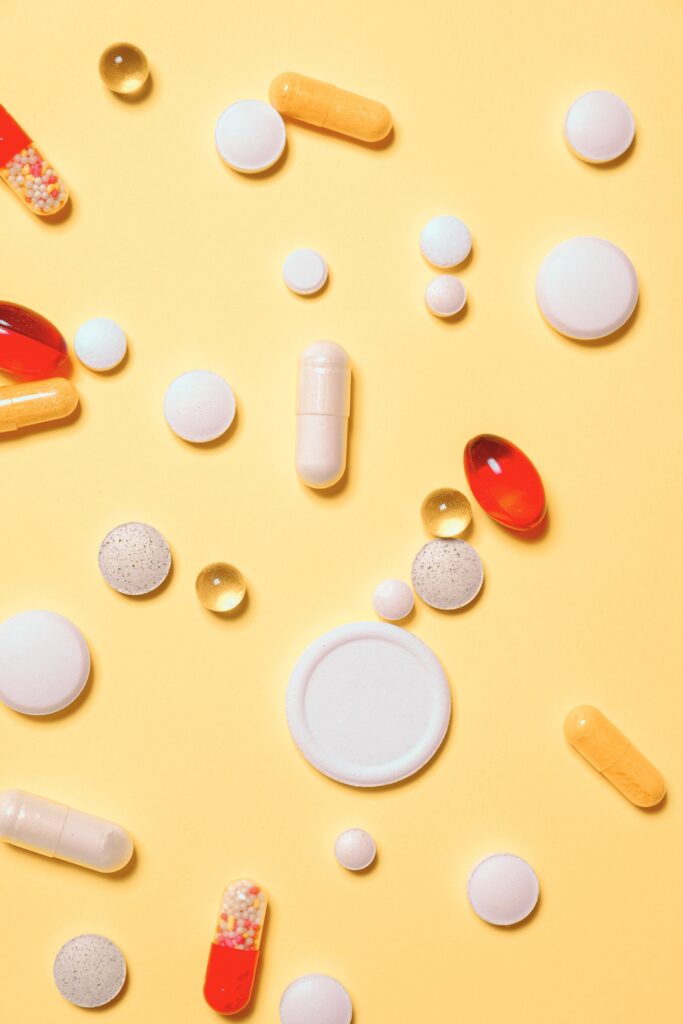Vitamin D: The benefits of the sunshine vitamin

So, what’s all the hype about vitamin D? What is Vitamin D and which are the benefits with it associated? And is it just sun-related or can it be found in foods too? Also, what happens when you are low on vitamin D and do supplements work? Well, here’s an answer to all your questions!
Vitamin D, also known as the “sunshine vitamin” is produced in our skin in response to sunlight. It’s a fat-soluble vitamin that our bodies produce naturally when directly exposed to sunlight. Although it is possible to get vitamin D through certain foods, it’s difficult to get the recommended amount from food alone and even when considering supplements, in order to ensure adequate levels of the vitamin in our blood, the main source of vitamin D still remains the action of sunlight on our skin.
There are several important functions that rely on vitamin D such as regulating the absorption of calcium and phosphorus, and facilitating normal immune system function. It is also vital for normal growth and development of bones, teeth, muscles, and it improves the resistance against certain diseases.
A vitamin D deficiency can cause bone abnormalities such as soft bones (osteomalacia) or fragile bones (osteoporosis).
But it does not end all here. Look deeper and you’ll find vitamin D is quite a wildcard!
The benefits of vitamin D

There are many benefits associated with Vitamin D. These are:
- Helps fighting diseases
Vitamin D, it appears, is an often-understated wild card warrior! According to a study published in 2006 in the Journal of the American Medical Association, vitamin D may play a significant role in reducing the risk of multiple sclerosis. A study published in the Jan. 13, 2004 issue of Neurology indicated that women who get doses of vitamin D that are typically found in daily multivitamin supplements of at least 400 IU (International Units), are 40% less likely to develop multiple sclerosis compared with those not taking over-the-counter supplements. Furthermore, low levels of the vitamin D is linked to an increased risk of type 1 diabetes, muscle and bone pain, and according to a research published in 2010 in the American Journal of Clinical NutritionTrusted Source it was discovered that it might even help reducing the risks of contracting the flu.
- Lowers the risks of cancer
As more and more evidence are collected, even just by analysing the effects of vitamin D deficiency on our body, we can come to understand the link between vitamin D and it’s beneficial effects when present in adequate levels. Low levels of the vitamin D is linked to diseases such as cancers of the breast, colon, prostate, ovaries, esophagus, and lymphatic system. In a study published in 2003 in the Journal of the American Medical Association, of more than 3,000 veterans (ages 50 to 75) at 13 Veterans Affairs medical centres, those who consumed more than 645 IU (International Units) of vitamin D a day along with more than 4 grams per day of cereal fibre had a 40% reduction in their risk of developing precancerous colon polyps. “Activated vitamin D is one of the most potent inhibitors of cancer cell growth, it also stimulates your pancreas to make insulin. It regulates your immune system.” – Michael F. Holick, PhD, MD, Head of the Vitamin D, Skin and Bone Research Laboratory at Boston University School of Medicine.
- Reduces the risks of heart disease and high blood pressure
According to the findings published in 2008 in the CirculationTrusted Source vitamin D is also responsible for decreasing the chance of developing heart disease. In an interesting study, overweight people who took a daily vitamin D supplement improved their heart disease risk markers. A study carried on at Boston University on people with high blood pressure who were exposed to UVA and UVB rays for three months showed that, not only their vitamin D levels increased by more than 100%, but that, more impressively, their high blood pressure normalized. One theory suggests that vitamin D reduces blood pressure by decreasing the production of a hormone called renin, which is believed to play a role in hypertension.
- Reduces depression
Yes, we are all a little chirper when the sun is out, but it’s not just because we can go out and play; there’s some interesting science behind the improved mood. In a study, the data collected showed that people with depression who received vitamin D supplements noticed an improvement in their symptoms. Interestingly, in another study of people with fibromyalgia (a long-term chronic condition of musculoskeletal pain, general fatigue and cognitive disturbance) researchers found that those who were also experiencing anxiety and depression also had a vitamin D deficiency. These breakthrough researches go to show that vitamin D might play an important role in regulating mood and aiding against depression.
- Boosts weight loss
If this wasn’t enough, it seems vitamin D can also help us regulate our weight! In a study, people who were taking a daily calcium and vitamin D supplement were able to lose more weight than the people who were given a placebo supplement. The result lead to scientist discovering that the extra calcium and vitamin D had an appetite-suppressing effect. So, consider adding vitamin D supplements to your diet if you’re trying to lose weight.
Vitamin D deficiency

Although the best way to assimilate vitamin D is by being exposed to sunlight, there’s many factors that can affect our ability to get sufficient amounts through the sun alone. For example:
- Living somewhere that have short daylight
- Being in an area with high pollution
- Living in big cities where buildings block sunlight
- Spending more time indoors (may it be due to disability, age, depression or pure laziness)
- Using sunscreen (although sunscreen is recommended to block UV rays)
- Having darker skin (the higher the levels of melanin, the less vitamin D the skin can absorb)
Vitamin D deficiency in adults can lead to various conditions, such as:
- Severe bone or muscle pain or weakness that may cause difficulty climbing stairs or getting up from the floor or a low chair, or cause you to walk with a waddling gait also known as myopathic gait, which is a way of walking.
- Stress fractures, especially in your legs, pelvis, and hips
- Tiredness, aches and pains, and a general sense of not feeling well
Doctors can diagnose a vitamin D deficiency with a simple blood test. In case of a deficiency, X-rays may be taken to check the strength of the bones. The usual recommendation will then be to take daily vitamin D supplements as well as rising the vitamin D levels through sunlight and diet.
Food sources of vitamin D

Not many foods contain vitamin D naturally. However, nowadays there’s additional options thanks to fortified foods (which simply means the vitamin D has been added!). These are:
- oily fish such as salmon, sardines, herring and mackerel
- egg yolk
- red meat
- liver
- fortified foods such as some cereal, orange juice, milk and yogurts (*In the UK, cows’ milk is not generally fortified with vitamin D).
Vitamin D supplements

For some, it can be hard to get enough vitamin D each day through sun exposure and food alone, so taking vitamin D supplements can help. Vitamin D supplements are available in supermarkets as well as in pharmacies and are relatively inexpensive. The main type is called D3 and is made from animal products but you can also find the plant alternative called D2.
One thing to remember about vitamin D supplements is that, although it is not possible to overdose on the vitamin D manufactured by our skin, it is however possible to have a toxic or overdose effect from vitamin D supplements. Vitamin D is a fat-soluble vitamin, meaning it’s stored in the body. A daily intake above 2,000 IU (international Units) can lead to kidney stones or kidney damage, muscle weakness, or excessive bleeding.
Supplements have also been subject of much debate. This is because supplements are not considered drugs (which are regulated by the Food and Drug Administration) meaning they are not put through the same strict safety and effectiveness requirements that drugs have to pass. Any type of drugs that can be bought, even without a prescription, must be proven safe and effective whereas dietary supplements do not. For more interesting facts on supplements click here.
How much do you need?

There has been some controversy over the amount of vitamin D needed for healthy functioning. What is evident is that recent research indicates that you need more vitamin D than was once thought and that its benefits are far greater than previously anticipated! Normal blood serum levels range from 50 to 100mcg (micrograms per decilitre) but depending on your blood level, you may need more vitamin D.
In the U.K. the NHS (National Health Service) has reviewed its guidelines on how much vitamin D is needed and can be found here. One in five people in the UK, under normal circumstances, has a vitamin D deficiency, and it is for this very reason that, since 2016, the Government has recommended a daily supplement of 10mcg, especially over winter when there is less sunlight, to ensure healthy levels. However, evidence also shows that you can take up to 100mcg a day with no adverse effects and that it may take several weeks to build up your vitamin D levels. Public Health England advises that in spring and summer, the majority of the population gets enough vitamin D through sunlight on the skin along with a healthy, balanced diet. However, it recommends that ethnic minority groups with dark skin as well as people whose skin gets little or no exposure to the sun, such as those in care homes or those who cover their skin when outside, should consider taking a year-round supplement. In terms of exposure to the sunlight, with the due care, 10 minutes a day may be enough for people with pale skin, while 25-30 minutes may be enough for everyone else.
When exposing yourself to the sun, always make sure you follow the recommended guidelines to avoid sunburn and other more serious conditions. You can click here for more information.
The anti-inflammatory sunshine vitamin: tuberculosis and Covid-19

Studies have shown that there is a link between the deficiency of vitamin D and the activation of tuberculosis (TB). The data revealed that serum levels of vitamin D in TB patients are lower than in healthy controls and that prolonged treatment of TB also causes a decline in serum vitamin D levels.
Today, vitamin D is yet again the subject of much research, this time as a treatment options to reduce the risk of coronavirus. This comes amid growing concern over the disproportionate number of black, Asian and minority ethnic people contracting and dying from the disease. One observation on people with darker skin is that, the higher the levels of melanin, the less vitamin D the skin can absorb and create. Vitamin D helps the body to handle viral respiratory infections by boosting the ability of cells to resist and even kill viruses as well as reducing harmful inflammation, which is one of the big problems with coronavirus. The belief is that it can cause the immune system to be weaker, but as of today there is not enough evidence to support that Vitamin D can prevent or help against coronavirus.
Conclusion

Our main source of vitamin D is from the action of sunlight on our skin, so it could be argued that the best way to get your vitamin D is to get some fresh air and get out there! As an added benefit if you pair that with some form of physical activity, which is hugelybeneficial to your body as well as your mental health, you’ll unlock a more rounded wellness. it’s a win-win!
What we know from the huge amount of data around nutrients, vitamins and, more in general about well-being, is that nothing should be considered in isolation. Food, for example, should be always considered in its complexity as the various nutrients in foods interact with each other and they behave very differently when isolated. Similarly, we should not look at vitamin C, or Vitamin A or…Vitamin D as the next best magical thing. None alone are enough for our well-being. All are needed to work together within our body in order to bring benefits.
Could vitamin D become the next warlord against diseases and even against coronavirus? Even if vitamin D was to turn out to be a valuable element in the fight against Coronavirus, it is likely many other factors would come into play too.
Think this: research from the University of Birmingham has shown that having a vitamin D deficiency increases the length of time patients stay in hospital. Does this mean that is we sunbathe all day long we shall recover faster? Not really. It is likely that people who have higher levels of vitamin D are also people who spend more time out because more active or sociable. This would mean they are likely to be fitter, they may be more aware of their nutritional intake, and also in a more positive mindset. On the opposite spectrum, it is possible that people who have vitamin D deficiency spend more time indoors because of a disability or mental state or because of age. It may also be that, due to lack of exercise they are also overweight and perhaps a bit depressed too. Their bodies may not be as healthy in fighting a condition and this may be why they spend more time recovering in a hospital.
One thing is sure: vitamin D has many benefits to speak of and if you pair it with getting some fresh air and doing some exercise and, even better, if you do so in good company, it appears you’ll have more benefits that you can shake a stick at.


